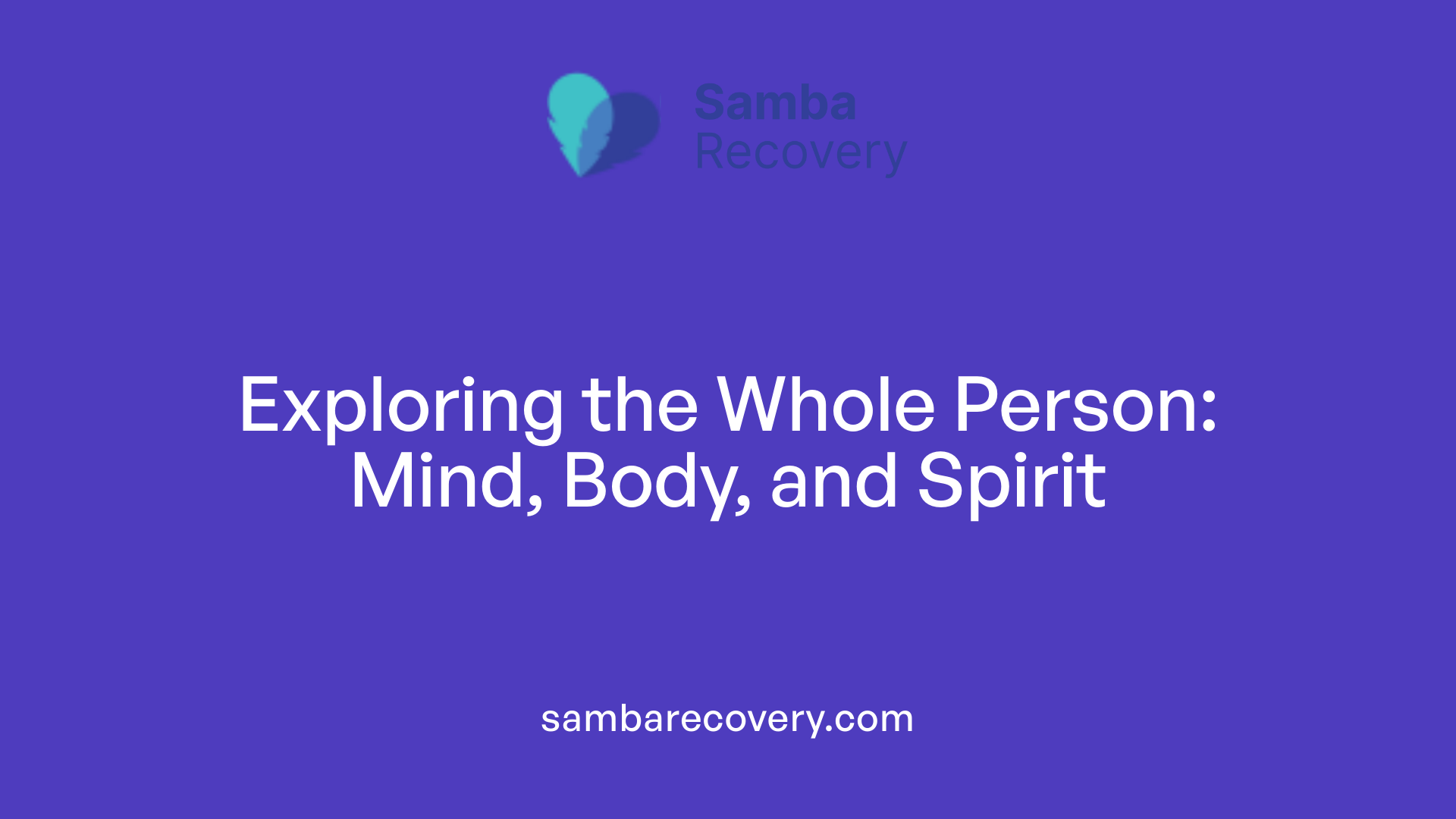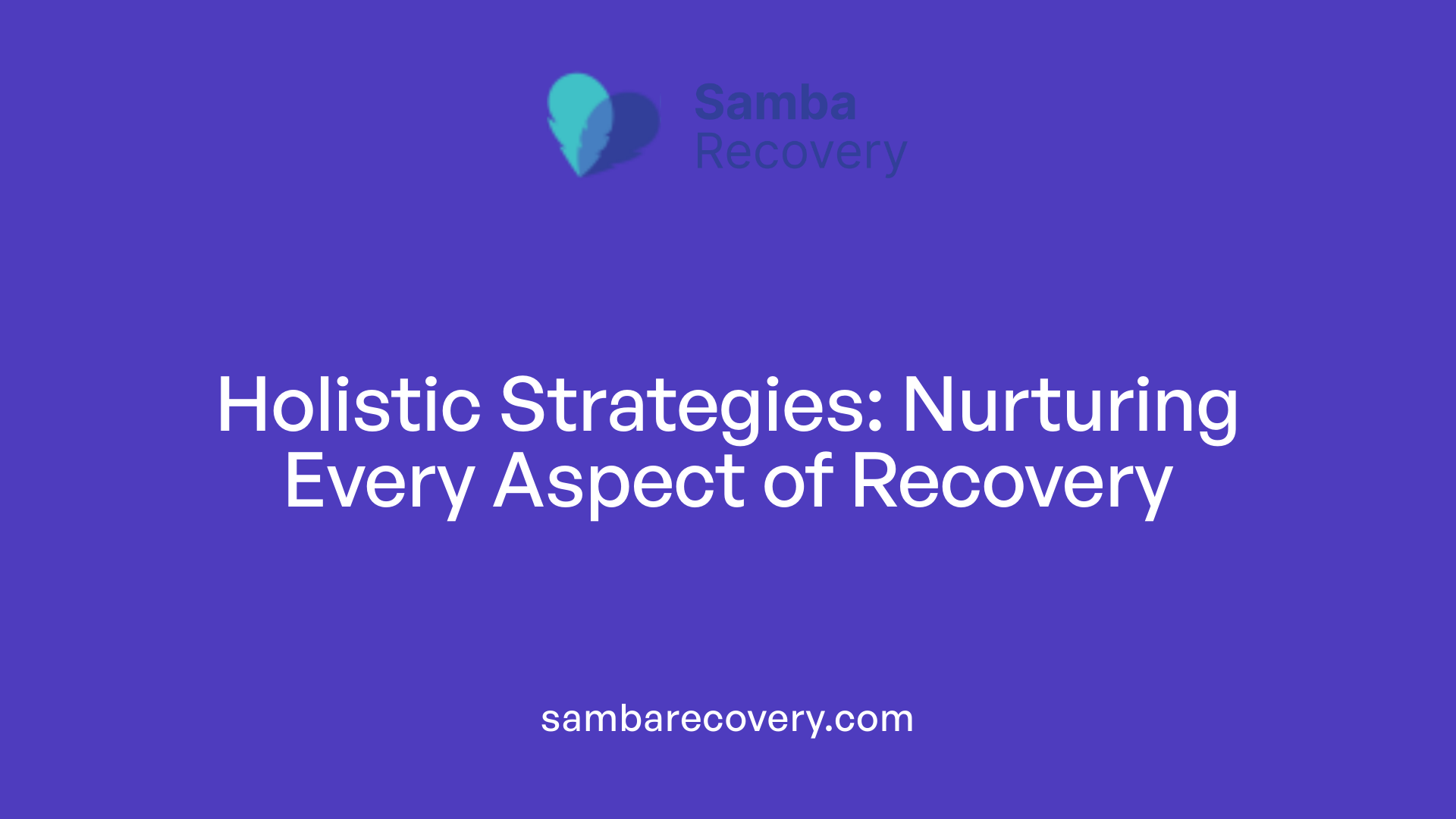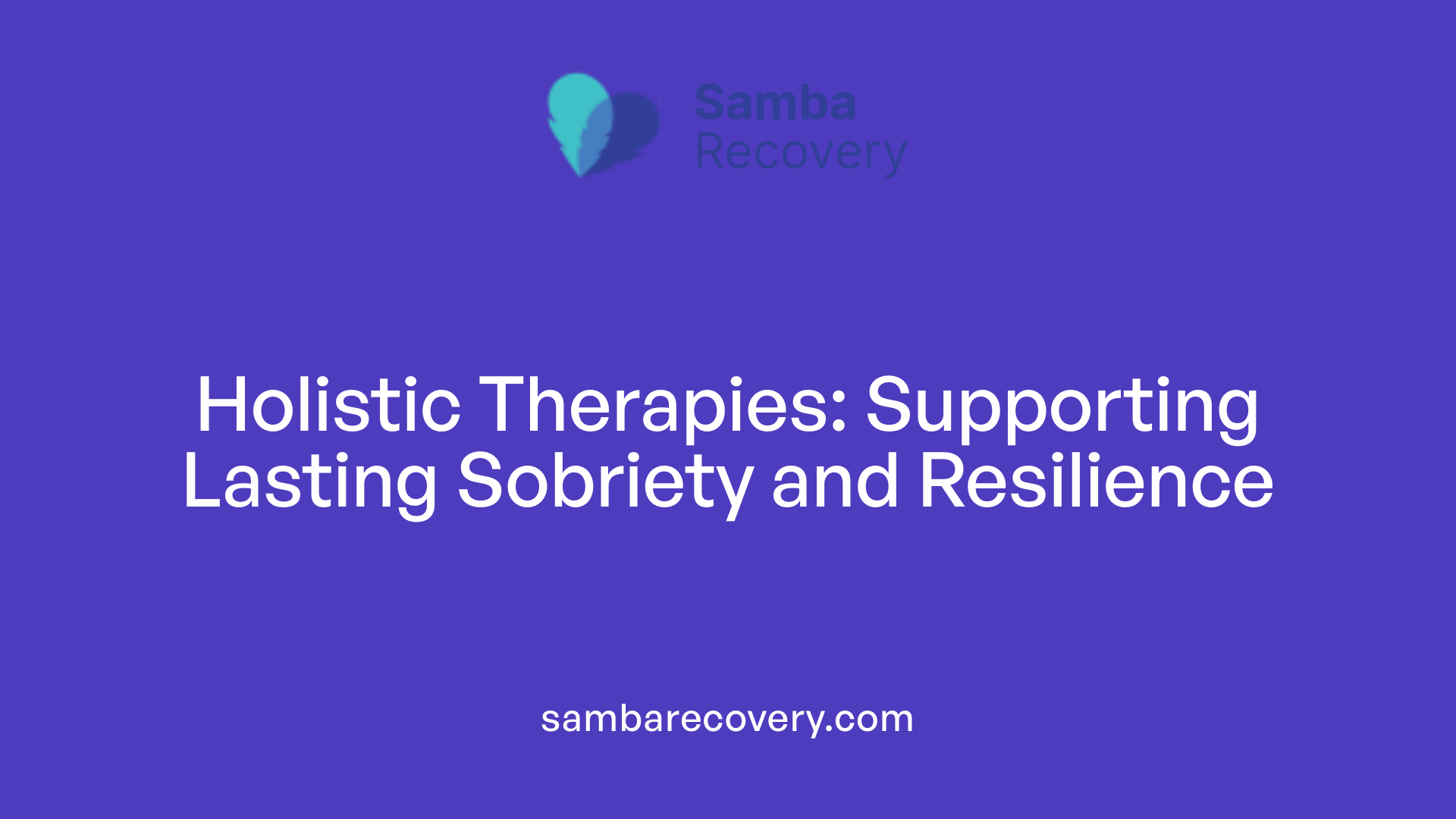Unlocking the Power of Holistic Healing in Addiction Recovery
Addiction treatment has traditionally focused on managing symptoms and detoxification. However, emerging evidence and clinical practices reveal that incorporating holistic approaches—addressing the physical, emotional, and spiritual dimensions—can significantly enhance recovery outcomes. This article explores how holistic healing modalities complement conventional treatments, addressing root causes, promoting well-being, and supporting sustained sobriety.
Understanding the Holistic Model in Addiction Treatment

What is the holistic approach to addiction recovery?
A holistic approach to addiction recovery emphasizes healing the entire person—mind, body, and spirit. Instead of focusing solely on removing substances, it integrates various therapies that nurture emotional stability, physical health, and spiritual growth.
This method includes practices such as nutritional counseling, exercise, meditation, yoga, art therapy, and spiritual activities like prayer or mindfulness. These therapies are designed to support overall well-being, build resilience, and address the emotional and psychological roots of addiction.
Holistic treatment often works alongside traditional therapies such as individual therapy, group counseling, cognitive-behavioral therapy (CBT), and participation in support groups like 12-step programs.
In some cases, detoxification incorporates herbal supplements and dietary modifications aimed at cleansing toxins and targeting underlying causes like trauma or emotional imbalance. The primary goal is to promote sustainable recovery through comprehensive healing—strengthening the individual physically, emotionally, and spiritually for long-term health and quality of life.
Why consider the interconnected aspects of health?
Addressing all elements of health helps prevent relapse by ensuring the person is equipped to handle triggers and stressors post-treatment.
Physical health improvements, such as better nutrition and exercise, can increase energy and reduce cravings. Mental wellness strategies like mindfulness and therapy help manage emotional triggers and obsessive thoughts.
Spiritual growth fosters a sense of purpose and belonging, which can be vital in overcoming feelings of emptiness or shame associated with addiction.
When these areas are treated together, individuals often experience higher satisfaction with treatment, better emotional stability, and a more balanced outlook on life.
How does the holistic model address underlying causes?
One of the strengths of the holistic approach is its focus on uncovering and treating foundational issues such as trauma, depression, anxiety, or unresolved emotional stress.
Therapies like art, music, or movement therapy allow expression of complex feelings that might be difficult to articulate otherwise.
Spiritual practices and community involvement help rebuild self-esteem and foster connection, reducing feelings of isolation that often accompany addiction.
By tackling these underlying causes directly, holistic treatment aims to prevent future relapse and promote deep, lasting recovery.
| Aspect of Healing | Therapies Used | Goals |
|---|---|---|
| Physical health | nutrition, exercise, detox | Repair body, increase energy |
| Emotional health | counseling, art, music therapy | Manage feelings, reduce stress |
| Spiritual growth | meditation, prayer, community groups | Find purpose, enhance self-esteem |
| Mental resilience | mindfulness, CBT, neurofeedback | Develop coping skills, reduce cravings |
This comprehensive approach strives to restore harmony among mind, body, and spirit, creating a strong foundation for a healthier, addiction-free life.
Components and Modalities of Holistic Healing

What components are involved in holistic healing for addiction?
Holistic healing for addiction takes a comprehensive approach, addressing all aspects of an individual’s well-being. It recognizes that addiction impacts not just the physical body but also the emotional, mental, social, and spiritual facets of a person.
One of the primary components involves physical health practices. These include proper nutrition to correct deficiencies and support overall health, regular exercise to detoxify the body and strengthen physical resilience, and sleep hygiene to promote rest and recovery. Movement therapies such as yoga and tai chi are also incorporated to improve physical well-being and reduce stress.
Mental health support is vital in holistic treatment. This includes psychotherapy options like cognitive-behavioral therapy (CBT), individual or group counseling, and practices such as journaling and mindfulness meditation to enhance emotional regulation and resilience.
Spiritual exploration is another essential element. It involves spiritual counseling, mindfulness practices, and community connections that foster a sense of purpose, belonging, and inner peace. Activities like meditation, yoga, gratitude exercises, and involvement in spiritual or religious groups can nurture spiritual growth.
Complementary therapies play a significant role in holistic healing. These include acupuncture, massage therapy, herbal remedies, art therapy, music therapy, and nature-based activities. Such modalities can help manage withdrawal symptoms, ease emotional difficulties, and promote relaxation.
The ultimate goal of holistic healing in addiction recovery is to treat the whole person. This involves identifying and addressing underlying causes such as trauma, stress, or mental health disorders while fostering healing and balance across all life domains.
| Component | Practices/Modalities | Purpose/Benefit |
|---|---|---|
| Physical health | Nutrition, exercise, sleep hygiene, yoga, tai chi | Repair body, boost energy, reduce cravings |
| Mental health support | Psychotherapy, mindfulness, journaling | Emotional resilience, stress reduction |
| Spiritual growth | Mindfulness, spiritual counseling, community | Inner peace, sense of purpose |
| Complementary therapies | Acupuncture, massage, art/music therapy, herbal remedies | Manage withdrawal, emotional relief, relaxation |
In conclusion, holistic healing involves a diverse array of components that work together to facilitate complete recovery. Integrating these elements with traditional treatments aims to promote lasting sobriety and overall well-being.
Holistic Strategies Supporting Physical, Mental, and Spiritual Well-Being

How do holistic methods support physical, mental, and spiritual well-being during addiction treatment?
Holistic methods play a vital role in addiction recovery by addressing all aspects of an individual’s health — physical, mental, and spiritual. They focus on treating the whole person, not just the symptoms of addiction, fostering a balanced and complete sense of well-being.
Physically, holistic therapies such as proper nutrition, exercise, yoga, acupuncture, and massage help repair bodily damage caused by substance use. These practices reduce withdrawal symptoms, improve energy levels, and promote overall physical health. Incorporating physical activity like walking, tai chi, or dance also enhances physical resilience and supports detoxification.
Mentally, mindfulness practices—including meditation, art therapy, and counseling—are used to develop emotional regulation and resilience. Techniques like journaling or engaging in creative arts enable individuals to process feelings, reduce anxiety, and manage stress more effectively. Mental health benefits are further strengthened through therapies such as cognitive-behavioral therapy (CBT) and group support, which foster emotional stability and self-awareness.
Spiritually, holistic approaches encourage self-reflection, connection, and purpose. Activities like meditation, spiritual counseling, and community involvement promote inner growth and a sense of belonging. Spiritual practices help individuals find meaning beyond their struggles, cultivating hope and resilience.
Most effective holistic programs seamlessly integrate these therapies with traditional addiction treatments, including counseling, medication-assisted therapy, and support groups. This combined approach offers a comprehensive pathway to recovery, balancing physical health, mental wellness, and spiritual growth.
Ultimately, holistic therapies enhance treatment satisfaction, reduce relapse risk, and support long-term sobriety by healing the whole person. They help individuals develop healthier habits, improve coping skills, and reconnect with their inner selves, paving the way for sustainable recovery.
Evaluating the Effectiveness of Holistic Therapies in Long-Term Recovery

How effective are holistic therapies in promoting long-term sobriety?
Holistic therapies are increasingly recognized for their role in supporting lasting recovery from addiction. These approaches address not just the physical symptoms but also emotional, mental, and spiritual aspects of a person’s health. Modalities such as mindfulness meditation, nutritional counseling, yoga, acupuncture, art therapy, and spiritual practices work together to foster self-awareness, emotional regulation, and stress resilience.
Research studies support the benefits of holistic therapy in addiction treatment. Recent findings indicate that individuals participating in holistic programs often experience lower cravings, improved mental health, and higher treatment engagement. These therapies help patients develop coping skills and resilience, key factors in preventing relapse.
Holistic treatment plans are personalized, considering each person’s unique emotional and physical needs. When integrated with traditional treatments like counseling and medication, holistic practices enhance overall well-being and treatment satisfaction.
In addition, stress reduction techniques such as meditation and movement-based therapies play a crucial role in strengthening mental resilience. These methods decrease emotional distress, promote calmness, and help individuals manage triggers that could lead to relapse.
Overall, evidence suggests that holistic therapies can effectively support long-term sobriety by fostering self-awareness, reducing stress, and building resilience. Combined with conventional treatment, they create a comprehensive approach that addresses the root causes of addiction and promotes sustained recovery.
Transforming Addiction Recovery Through Holistic Care
Integrating holistic approaches with traditional addiction treatments offers a comprehensive pathway to recovery. By addressing physical health, emotional resilience, and spiritual growth, these therapies facilitate deeper healing and foster skills essential for maintaining sobriety. As research continues to validate their effectiveness, holistic methods are becoming an indispensable part of addiction recovery programs, empowering individuals to reclaim their well-being and build a balanced, fulfilling life beyond addiction.
References
- Holistic Therapy for Addiction Treatment
- 7 Benefits Of A Holistic Approach To Addiction Treatment
- Holistic Addiction Treatment Programs & Rehab Centers Near Me
- An holistic approach to substance abuse treatment – PubMed
- What Is Holistic Treatment for Drug Addiction? – Crest View
- Find Holistic Substance Abuse Treatments | GreeneStone Blog
- The Benefits of Holistic Approaches in Addiction Treatment
- Holistic Addiction Treatment for Mind, Body, Spirit – Evolve Indy
- Holistic Approaches to Addiction Treatment
- Holistic Approaches to Addiction Recovery – The Blanchard Institute






